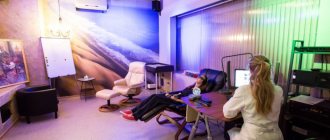Parapsychology
astro-kot.ru > Science > Parapsychology > Parapsychology – what is it?
The author of the term “parapsychology” belongs to Doctor of Philosophy Max Dessoir. The prefix para- means “near” or “next to.” In Dessoir's interpretation, parapsychology is a designation for mental disorders and medical methods of treating deviations. But during the 20th century the interpretation changed.
- 1 Parapsychology as a science
- 2 What does parapsychology study?
- 3 Parapsychology - what is it? Brief and clear
Parapsychology as a science
Parapsychology as a scientific term was first used at the beginning of the 20th century. During World War II, he got his own sign, which meant many forms of psycho-phenomena - ¥. This is a letter of the Greek alphabet called "psi".
In some countries, psi phenomena are called:
| Term | A country |
| Psychotronics | Eastern Europe |
| Psychic Research | England |
| Metapsyche | France |
| Bioenergyinformatics | Russia |
Diploma, Bachelor, Master, Doctor - Parapsychology.
Programs (modules) of all specialties offered by Bircham International University correspond to the Master's level, and can be adapted to the levels of Specialist, Expert, Bachelor and Ph.D. It is also possible to study the subjects of each module separately. This program can be combined with other modules or supplemented by disciplines from another module of the same faculty. For example: Spiritual Science - Integral Natural Therapy - Mythology and Occultism - Religion - Thanatology - Soul Therapy - Transpersonal Psychology.
Diploma - Specialist / Expert - Parapsychology - remotely Cost: 1.050 Euros (1.350 US$) ... 1.470 Euros (1.890 US$). Diploma - Specialist / Expert - remotely: 15 ... 21 A.K. (academic credits) are required to complete this program More... Structure: Parapsychology - distance learning = 42 A.K. (academic credits) - Select from the list of program subjects 5 disciplines for certified specialists or 7 subjects for an expert diploma.
Bachelor's Degree - Parapsychology - distance learning Cost: Min. 3.510 Euros (4.420 US$) … Max. 6,800 Euros (8,700 US$). Bachelor's degree - distance learning: 130 A.K. (academic credits) are required to complete this program More... Structure: Parapsychology - distance learning = 42 A.K. (academic credits) + 60 general education points credited from previous education and professional experience + You can choose several additional subjects from other modules in this department. Any proposal to change the curriculum must be approved by the Bircham International University Curriculum Committee. For example: Mythology and occultism.
Master - Master - Parapsychology - remotely Cost: Min. 4.680 Euros (6.120 US$) … Max. 7,020 Euros (9,180 US$). Master - Master - remotely: 36 ... 54 A.K. (academic credits) are required to complete this program More... Structure: Parapsychology - distance learning = 42 A.K. (academic credits) + You can choose several additional subjects from other modules of this faculty. Any proposal to change the curriculum must be approved by the Bircham International University Curriculum Committee. For example: Mythology and occultism. + 13 A.K. (academic credits) (thesis or dissertation. More...).
Doctoral degree (Ph.D.) - Parapsychology - remotely Cost: Min. 5.850 Euros (7.650 US$) … Max. 9,360 Euros (12,240 US$). Doctoral degree (Ph.D.) - remotely: 45 ... 72 A.K. (academic credits) are required to complete this program More... Structure: Parapsychology - distance learning = 42 A.K. (academic credits) + You can choose several additional subjects from other modules of this faculty. Any proposal to change the curriculum must be approved by the Bircham International University Curriculum Committee. For example: Mythology and occultism. + 18 A.K. (academic credits) (thesis or dissertation. More...).
BIU offers installment payments up to 36 months without a deposit. Further…
Bircham International University develops training programs individually for each applicant, based on his/her previous education, work experience and preferences. Further…
Parapsychology - remotely
List of academic disciplines (each subject is 3 AK):
1 academic credit (A.C.) BIU = 1 semester A.C. USA (15 hours of training) = 2 A.K. ECTS (30 hours of training). You can study any subject as a separate online continuing education course. Further…
Perception and Cognition This course examines the complex process of perceiving and receiving information through our senses and forming a subjective picture of the world. The acquisition and transfer of knowledge requires the sequential activity of a cognitive structure in which meaning is developed about the events and conditions that affect us. This course examines the themes of consciousness and choice that influence our deductive and creative processes. Academic Supervisor: Román Gonzalvo Pérez Esoteric Traditions This course explores esoteric traditions and the various philosophical questions they raise. An overview of the attitude of many thinkers to the myths and spiritual beliefs of their time is offered, as well as the mutual influence on the evolution of esoteric knowledge, philosophical thought and beliefs. Supervisor: Robert Burton Bradley Hypnosis and Suggestion This course explores the history of hypnosis, the trance state, levels of induction, deepening techniques, post-hypnotic suggestion, reporting, preliminary experimental studies of induction, and the achievement of stated goals. Describes the use of suggestion for rapid personality change, resolution of physical and emotional problems, creativity, and spiritual growth. Academic Supervisor: Susana Merino Lorente Body, Mind, and Spirit Connections This course explains the importance of the mind, body, and spirit connections. Discusses various types of stress management practices, meditation techniques, guided imagery, exercise, biofeedback, and forms of artistic expression related to emotional states of health or illness. Academic Supervisor: Robert Burton Bradley Human Consciousness This course examines human consciousness. The brain with its complex biochemical, physiological, and nervous processes is the material substrate of consciousness. Consciousness is a subjective image of the objective world, a phenomenon beyond the reach of neuroscience. Even a detailed study of brain function and neuronal activity may not be sufficient to explain a person's ability to be aware of the world around him and himself. Academic Supervisor: Román Gonzalvo Pérez Psychic Experience This course explores, in the absence of absolute proof in the scientific sense, the experiences of psychics and the existing arguments in their favor. Human consciousness can exist independently of brain activity. Many of the famous and supernatural abilities of psychics, their visions and predictions cannot be attributed to the simple physical functioning of the brain. Academic Supervisor: Román Gonzalvo Pérez Psychic Illusions This course takes an in-depth look at the world of parapsychology and shows why many scientists, philosophers and theologians have treated the topic with disrespect. In addition, the techniques and tricks used to simulate many parapsychological phenomena are explored, and tools for investigating and carefully evaluating parapsychological experiments are also explored. Supervisor: Román Gonzalvo Pérez Exploring Dreams The Exploring Dreams course examines what dreams are and how they happen. Dreams occur primarily during the rapid eye movement (REM) stage of sleep, when brain activity is high and similar to waking activity. Dreams can also occur during other stages of sleep. There are different stages and types of dreams, which are also associated with different brain waves. Supervisor: Frances Chelos Lopez Lucid Dreaming The Lucid Dreaming course examines dreams during which the dreamer is aware that he or she is dreaming. During lucid dreams, the dreamer can gain some control over the dream characters, narrative, and environment. Lucid dreams typically occur during rapid eye movement (REM) sleep, but can also occur during meditation, napping, and visualization. Academic Supervisor: Susana Merino Lorente States of Consciousness This course focuses on the analysis of waking, sleeping, and dreaming as examples of states of consciousness from the perspectives of biology, psychology, physiology, and neuroscience. Identifies the main models of the philosophy of consciousness and analyzes attention in detail. Academic Supervisor: Frances Chelos Lopez Philosophy of Mind This course examines the main aspects of the philosophy of mind from a multidisciplinary perspective. Students will study topics such as the relationship between mind and body; intentions and perceptions; individual sensations and the process of self-awareness; the nature of mental states and much more. Supervisor: Agusti Guisasola Prados Extrasensory Perception This course examines cases, laboratory studies, and applications of psychic phenomena and extrasensory perception (ESP). Explores the use and testing of psychic phenomena, including dreams, dreams, intuitions and extrasensory perceptions. He also explores psychic powers such as telepathy, precognition, psychokinesis (PK), bilocation, healing, and other supernatural abilities that cannot be explained by the physical functioning of the brain. Academic Supervisor: Susana Merino Lorente Parapsychology The purpose of this course is to study philosophical and empirical tests that allow parapsychological phenomena to be considered as serious evidence. During the training, four types of phenomena will be highlighted that prove the existence of extrasensory perception and psychokinesis. Five evidence of life after death will also be analyzed: seer messages, the emergence of the soul, the movement of things, reincarnation and out-of-body experiences. Academic Supervisor: Román Gonzalvo Pérez Psychic Communication This course explores the different types and characteristics of psychic communication with the dead and telepathy. Psychic communication has been known since time immemorial and continues to this day. Experimental psychological research allows us to identify phenomena and facts that cannot be explained by conventional forms of communication. Scientific supervisor: Roman Gonzalvo Pérez
Distance learning allows you to combine study, work and personal life under such extraordinary conditions Read more…
Parapsychology - distance learning - distance learning
Links to recommended professional associations. Belonging to professional associations is the best way to grow professionally.
Belonging to professional associations is the best way to grow professionally. Requirements for candidates vary depending on the faculty, qualifications and graduate data, so BIU cannot guarantee membership of its graduates in various associations. Bircham International University does not participate or act as an intermediary in this process. BIU only provides links to professional associations on a faculty-by-faculty basis. If you are interested in any organization, please contact them directly. Further…
AAI - Association Alpha International ABPCM - Associação Brasileira de Parapsicologia e Ciências da Mente AIP - American Institute of Parapsychology AIPA - Asociación Iberoamericana de Parapsicología CEPPI - Center d'Etudes Parapsychologiques et des Phénomènes Inexpliqués EHEN - Exceptional Human Experience Network Eternea - Science & Spirituality for Transformation GCP - Global Consciousness Project GERP - Groupe d'Etude et de Recherche en Parapsychologie IANDS - International Association of Near Death Studies IASD - International Association for the Study of Dreams ICRL - International Consciousness Research Laboratories Info-Psi - Information en Parapsychologie ISP - International Society for Psychophysics LFR - Laboratories for Fundamental Research NDERF - Near Death Experience Research Foundation PF - Parapsychology Foundation PSI - Parapsychological Skeptical Investigations RRC - Rhine Research Center SEAMP - Sociedad Española de Amigos del Misterio y la Parapsicología SEIP - Sociedad Española de Investigaciones Parapsicológicas SGI - Sociedade Gnóstica Internacional SPR - Society for Psychical Research SSE - Society for Scientific Exploration TPA - The Parapsychological Association WRC - Windbridge Research Center More...
You can submit documents and register at any time from any country. Further…
Requirements for applicants – Parapsychology
What does parapsychology study?
Parapsychology is a science that studies the anomalous and hidden capabilities of people and animals, as well as issues related to life after death.
The concept of psi phenomena includes:
- telekinesis;
- clairvoyance;
- suggestion;
- poltergeist;
- teleportation;
- pyrokinesis;
- healing;
- channeling;
- levitation;
- spiritualism;
- reincarnation.
The founder of the school of modern parapsychology, D. B. Rhine, believed that psi phenomena are divided into extrasensory perception (telekinesis, clairvoyance) and psychokinesis - the ability to influence matter with thoughts.
Science rejects psi phenomena. The reasons for this are the lack of evidence, as well as the fact that many schools of research into psi phenomena are funded from private sources, bypassing the state.
Psi phenomena cannot be reproduced again, so the scientific community cannot testify to the fact of their existence. However, researchers were able to study the patterns of hypnosis, phenomenal memory and human mathematical abilities.
Cases of deception are not uncommon among parapsychologists; this only increased criticism and mistrust of them as scientists. Despite this, research in private centers continues today. In addition to psi phenomena, they explore related topics that are studied by official science - neurophysiology (the connection between the brain and the psyche), as well as experimental psychology.
PARAPSYCHOLOGY
PARAPSYCHOLOGY
- an area of research that studies mainly: 1) forms of sensitivity that provide ways of receiving information that cannot be explained by the activity of known sense organs; 2) appropriate forms of influence of a living being on physical phenomena occurring outside the body, without the mediation of muscular efforts (by desire, mental influence, etc.). Along with the concept of “parapsychology”, the concepts of “psychotronics”, “bioinformation”, “biointroscopy”, etc. are also used. Most modern parapsychologists identify the following types of forms of sensitivity. Telepathy is mental communication between the transmitter and the receiver (inducer and recipient). Clairvoyance is the acquisition of knowledge about objective events in the external world, not based on the work of known sense organs and judgments of the mind. Foresight (proskonia) is a special case of clairvoyance, relating to the prediction of future events. Dowsing (also called the biophysical effect) - searching with the help of an auxiliary indicator (curved metal wire, vine, etc.) for accumulations of groundwater, ores, voids, etc. Paradiagnostics - staging honey based on clairvoyance. diagnosis without contact with the patient. All these forms of sensitivity are often combined under the term “extrasensory perception.”
P. also has a classification of forms of parapsychic influence on external physical phenomena. Psychokinesis is a person’s mental influence on surrounding objects, for example, on the normal electrical activity of a plant, on the position in space of various (usually light) objects. Paramedicine is an area adjacent to P., which includes a variety of treatment methods that have no explanation: treatment by laying on of hands, mental suggestion (without the use of speech and without direct contact, sometimes at a great distance), etc.
Essentially, the only reason for parapsychologists to unite all these areas is the mystery and enigma of the phenomena being studied. However, it is fundamentally wrong to consider such a basis sufficient for identifying a special area of scientific research.
In European culture, psychology as a direction of systematic research and observation arose in 1882, when the Society for the Study of Psychical Phenomena, which still exists today, was organized in London. Since then, numerous similar organizations have been created and then dissolved in many countries. According to parapsychologists, in the early 1970s. There were more than 240 laboratories and societies in 30 countries (most in the USA). Many of them are united by the International Parapsychological Association (New York). Parapsychological research is carried out on a small scale at a number of universities (mostly private) in the United States and other research centers funded by the government and large firms. In 1969, the American Association for the Advancement of Science, which unites various scientific societies, accepted the American Parapsychological Association as a member. Research on P., as a rule, is published in special journals published in a number of countries; Monographs are published, the results of conferences and symposiums on P.
In the USSR since the 1920s. in Leningrad, V. M. Bekhterev’s student L. L. Vasiliev conducted research in the field of telepathy and clairvoyance. In 1965, a bioinformation section was organized under the Moscow Board of the Scientific and Technical Society of Radio Engineering and Telecommunications named after. A. S. Popova. In 1967, a section of technical P. and biointroscopy was created under the Central Board of the Scientific and Technical Society of the Instrument-Making Industry.
At first, rather primitive research methods were used in P. (guessing cards, inducing dreams or thoughts, etc.). Criticism and revelations of parapsychologists' claims forced them to look for new means of proof. Parapsychological methods were greatly influenced by the influx of engineers and physicists, who brought their own research methods to parapsychology, suggesting that the human brain acts like an electronic device and that concepts taken from the relevant branches of physics can be directly applied to its study. Therefore, modern computing uses a number of the latest technical means, in particular computer technology. Some parapsychologists wrongfully believe that the phenomena they study are ordinary physical phenomena that can be explained using electromagnetic radiation.
Search and measurement of electromagnetic fields, called differently (bioplasma, electroauro-gram, biopotential, etc.), in combination with various traditional research methods (for example, guessing one of 5 special cards - the so-called Zener cards, suggestion at a distance, etc.) continue. This means that instrumental, including the most modern, methods for assessing the functional states of an individual have been developed within the framework of P. Certain private research methods that are used in psychology, although they do not reveal the nature of parapsychological phenomena, sometimes turn out to be useful for psychophysiology and experimental psychology. The lack of methodological correctness in setting up many parapsychological experiments, naturally, caused and continues to cause distrust and irritation among scientists, which are intensified due to too frequent cases of direct mystification and deception. The reason for mistrust is also that parapsychological phenomena are irreproducible, that is, they do not meet the requirements for the reliability of scientific facts. The non-reproducibility of phenomena is explained by parapsychologists by referring to the uniqueness of parapsychological phenomena: they arise in special mental states, they are not easy to cause, they are extremely unstable and disappear as soon as any external or internal conditions turn out to be unfavorable for them. This is the main difficulty in interpreting parapsychological phenomena. Some of them, apparently, cannot be completely excluded. However, recognition of their existence is hampered by the unknown channel of information transmission or influence. The main hopes and efforts of a number of parapsychologists are focused on studying the electromagnetic field of organisms as a means of biological communication and a carrier of information. These studies are carried out on insects, animals and humans, but many modern authors, at least outwardly, do not connect their work with P. The physical basis of these phenomena has not yet been discovered.
Thus, in what is united by the concept of P., it is necessary to distinguish, on the one hand, imaginary “supernatural” phenomena advertised by mystics and charlatans, and, on the other hand, phenomena that may exist, but have not yet received satisfactory scientific psychological and physical explanation. The former require exposure and demystification. The study of the latter is carried out in psychological, physiological, biophysical and other relevant scientific institutions and requires strict medical supervision.
Bibliography:
Vasiliev L.L., Mysterious phenomena of the human psyche, 3rd ed., M., 1964; 3 and Nchen-k about V.P. [et al.], Parapsychology: fiction or reality?, “Questions of Philosophy”, 1973, Up to 9; Hanzel Ch., Parapsychology, trans. from English, M., 1970; Z o-rab G., Bibliography of parapsychology, NY, 1957; Pratt JG, The parapsychology: an insider's view of ESP, NY, 1964; U liman M., K rip pn er S., Dream studies and telepathy, NY, 1970; McConnel RA, ESP; curriculum guide, NY, 1971.
V. P. Zinchenko, A. H. Leontiev (TSB, 3rd ed., vol. 19).
When did parapsychology arise, what is it even?
Parapsychology is a discipline aimed at detecting paradoxical biophysical phenomena in living beings. In essence, she studies: telekinesis (the ability to use the power of thought to influence physical objects), telepathy (transfer of information without any action using the brain), clairvoyance (seeing any events in the future), reincarnation (the ability to be reborn again after death) , aerokinesis (the ability to control the flow of air with the power of thought), suggestion (mental suggestion). Parapsychology arose relatively recently. In another way, we can say that this “science” is aimed at studying all paranormal phenomena in the world from a mental point of view.
What psychology studies: features of the discipline
Psychology is a science that studies human will, attention, consciousness, memory functions and behavioral characteristics. Memory can be called an analogue of a storage device, which can be either permanent or short-term
In modernized psychology, it is customary to distinguish the following types of memory:
- Emotional. It is human nature to retain memories of experienced feelings over a long period of time.
- Figurative. An image once seen can emerge in memory even several decades later.
- Tangible, including information about tactile contact.
- Motor. With its help, the driver of the vehicle brings the control of the vehicle to automaticity, and the dancer flawlessly performs a once memorized sequence of movements.
- Auditory and visual.
Memory is a complex, difficult process that is necessary for the transfer of knowledge and accumulated experience from generation to generation. However, in the case of painful memories, a person's subconscious mind may erase them in order to minimize the impact of stress. Equally difficult to understand is the concept of attention, which allows the subject to concentrate on observing or performing tasks that require special care.
Through lengthy analytical work and practical experiments, psychologists were able to identify the following types of attention:
Switchable (fickle attention). Distributed (allowing you to control several processes simultaneously). Selective (when it is possible to select one of the objects for observation).
Psychology is a science that studies the causes and factors due to which certain patterns of perception and patterns in the behavior of humans and animals were formed. The discipline is distinguished by a very wide range of interests, including the formation of mental processes of the individual (cognitive abilities, perception at the level of sounds, smells and colors), mental properties (such as character, temperament, activity), conscious and unconscious processes and the laws of higher nervous activity .







